
Alton Glen (Glenn) Miller was an American big band founder, owner, conductor, composer, arranger, trombone player, and recording artist before and during World War II, when he was an officer in the US Army Air Forces. Glenn Miller and His Orchestra was one of the most popular and successful bands of the 20th century and the big band era. His military group, the Major Glenn Miller Army Air Forces Orchestra, was also popular and successful.
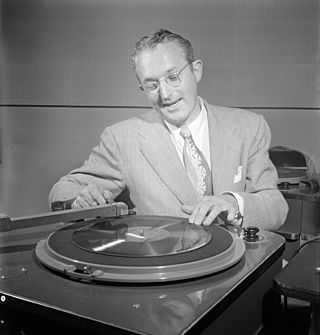
Thomas Francis Dorsey Jr. was an American jazz trombonist, composer, conductor and bandleader of the big band era. He was known as the "Sentimental Gentleman of Swing" because of his smooth-toned trombone playing. His theme song was "I'm Getting Sentimental Over You". His technical skill on the trombone gave him renown among other musicians. He was the younger brother of bandleader Jimmy Dorsey. After Dorsey broke with his brother in the mid-1930s, he led an extremely successful band from the late 1930s into the 1950s. He is best remembered for standards such as "Opus One", "Song of India", "Marie", "On Treasure Island", and his biggest hit single, "I'll Never Smile Again".
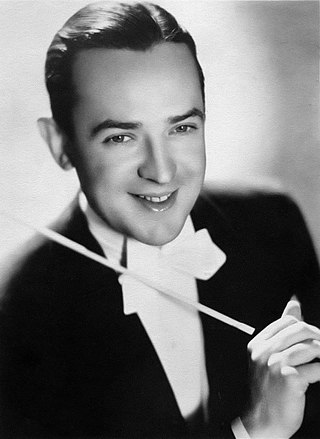
James Francis Dorsey was an American jazz clarinetist, saxophonist, composer and big band leader. He recorded and composed the jazz and pop standards "I'm Glad There Is You " and "It's The Dreamer In Me". His other major recordings were "Tailspin", "John Silver", "So Many Times", "Amapola", "Brazil ", "Pennies from Heaven" with Bing Crosby, Louis Armstrong, and Frances Langford, "Grand Central Getaway", and "So Rare". He played clarinet on the seminal jazz standards "Singin' the Blues" in 1927 and the original 1930 recording of "Georgia on My Mind", which were inducted into the Grammy Hall of Fame.

Raymond Stanley Noble was an English jazz and big band musician, who was a bandleader, composer and arranger, as well as a radio host, television and film comedian and actor; he also performed in the United States.

The Dorsey Brothers were an American studio dance band, led by Tommy and Jimmy Dorsey. They started recording in 1928 for OKeh Records.

Ray McKinley was an American jazz drummer, singer, and bandleader. He played drums and later led the Major Glenn Miller Army Air Forces Orchestra in Europe. He also led the new Glenn Miller Orchestra in 1956.
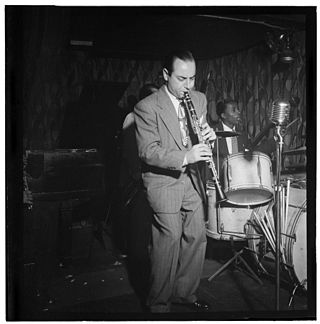
Michael Andrew "Peanuts" Hucko was an American big band musician. His primary instrument was the clarinet, but he sometimes played saxophone.
"I'm Getting Sentimental Over You" is a song recorded by Tommy Dorsey and His Orchestra. The words were written by Ned Washington and the music was written by George Bassman. It was first performed in 1932. The original copyright is dated 1933 and issued to Lawrence Music Publishers, Inc. The copyright was assigned to Mills Music, Inc. in 1934. Noni Bernardi, a saxophonist with the Dorsey orchestra arranged this song.

Leonard William Hambro, known as Lenny Hambro, was a journeyman jazz musician who played woodwinds, primarily alto saxophone, with a host of bands, orchestras, and jazz notables from the early 1940s through the mid-1960s, and continued as a session musician, music producer, booking agent, and entertainment coordinator through the mid-1990s. Early in his professional career, Hambro spelled his name "Lennie" but changed it to the former spelling in 1954, although he was occasionally referred to as "Lennie" in the press as late as 1957. Hambro broke into the profession with Gene Krupa in 1942. However, he is best known for his time as manager and assistant band leader with the New Glenn Miller Orchestra under the direction of Ray McKinley. He was well known in the Latin Jazz community and was closely associated with Chico O’Farrill.

"Basin Street Blues" is a song often performed by Dixieland jazz bands, written by Spencer Williams in 1928 and recorded that year by Louis Armstrong. The verse with the lyric "Won't you come along with me / To the Mississippi..." was later added by Glenn Miller and Jack Teagarden.

Ernesto Caceres was an American jazz saxophonist born in Rockport, Texas. He was a member of the Glenn Miller Orchestra from 1940 to 1942.
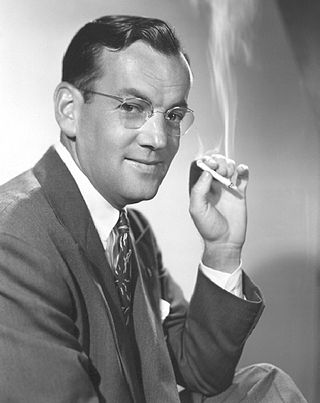
Between 1938 and 1944, Glenn Miller and His Orchestra released 266 singles on the monaural ten-inch shellac 78 rpm format. Their studio output comprised a variety of musical styles inside of the Swing genre, including ballads, band chants, dance instrumentals, novelty tracks, songs adapted from motion pictures, and, as the Second World War approached, patriotic music.
This Is Tommy Dorsey & His Orchestra, Vol. 1 is the first of two volumes originally released in a 1971 series by RCA Victor, which was created in response to a resurgence in big band recreations during the late '60s and early '70s, and is a reissue of 20 famous recordings by Tommy Dorsey & His Orchestra. The album was subsequently re-released in 2001 by Collectables Records.

Annie's Cousin Fannie, which is sometimes listed as "Annie's Cousin Fanny", is a 1934 song composed by Glenn Miller and recorded by The Dorsey Brothers Orchestra for Brunswick and Decca Records. The Dorsey Brothers released two versions of the song in 1934 and 1935.

"Sold American" is a 1938 song composed by Glenn Miller with John Chalmers "Chummy" MacGregor and recorded for both Brunswick and RCA Bluebird.

"Tomorrow's Another Day" is a 1935 song composed by Glenn Miller for the Dorsey Brothers Orchestra. The song was released as a 78 single by the Dorsey Brothers Orchestra on Decca Records.

"Harlem Chapel Chimes" is a 1935 jazz instrumental composed by Glenn Miller. The song was released as an A-side 78 single by the Dorsey Brothers Orchestra.

The Glenn Miller Carnegie Hall Concert is a live album by Glenn Miller and his Orchestra. It documents a live concert recorded in Carnegie Hall in 1939. The album was released by RCA Victor in 1958.
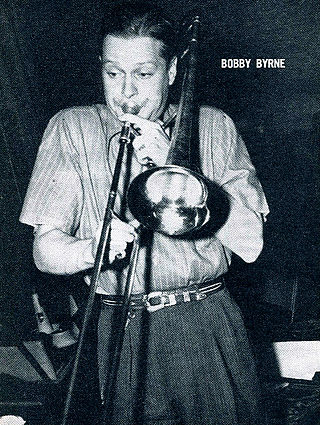
Robert Byrne was an American bandleader, trombonist, and music executive. His big band was well regarded. He flew aircraft in World War II, and later became a musical producer for television and albums credited to other artists.

















